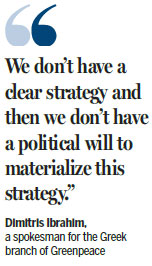Despite EU fines, Greece struggling to boost garbage recycling nationwide
By Xinhua-afp (China Daily) Updated: 2017-04-10 07:10ATHENS, Greece - A steady stream of EU fines and two decades of trying have failed to get recycling off the ground in Greece, where eco-awareness is only halfheartedly promoted by authorities.
According the European Environment Agency, only 16 percent of household waste is recycled across the country, compared to a 50-percent target by 2020 under EU directives.
In contrast, the European recycling average is 28 percent, with Slovenia leading at 49 percent and Latvia bringing up the rear at 3 percent.
In Athens, with nearly 4 million inhabitants out of the country's 11 million, only 13 percent of eligible waste is recycled, town hall figures show.

"We don't have a clear strategy and then we don't have a political will to materialize this strategy," said Dimitris Ibrahim, a spokesman for the Greek branch of Greenpeace.
Around many parts of the country, and especially in the countryside, garbage is still scattered piecemeal in makeshift dumps - one of them on a hillside on Andros island actually collapsed under the strain in 2011, burying a beach below in the process.
In 2014, Greece still had some 70 dumps, most of them tolerated if not actively run by municipal authorities.
In June 2014, nearly a decade after a prior conviction, Greece was ordered to pay a fine of nearly 15 million euros ($15.88 million) every six months over the continued operation of illegal landfills.
The European Court of Justice has repeatedly condemned Greece on this score, levelling fines amounting to millions of euros, with the latest ruling in September.
"The mentality needs to change, and urgently," said Antigone Dalamaga, head of the Ecological Recycling Society association.
It takes "incentives and counter incentives ... you need to convince your citizens of the necessity and of the positive affect of recycling," she said.
But even today, Greeks are only encouraged to sort out their household waste on a voluntary basis. No fines are involved.
And Mary Krimnanioti, who runs the EU-funded Zero Waste program in Greece, says the logic behind the municipal waste collection - which charges residents depending on property size - is flawed.
"It is not (calculated) according to the waste you throw away, it's according to the (surface area in) square meters of your house," she told AFP.
- 'Cooperation is complementary'
- Worldwide manhunt nets 50th fugitive
- China-Japan meet seeks cooperation
- Agency ensuring natural gas supply
- Global manhunt sees China catch its 50th fugitive
- Call for 'Red Boat Spirit' a noble goal, official says
- China 'open to world' of foreign talent
- Free trade studies agreed on as Li meets with Canadian PM Trudeau
- Emojis on austerity rules from top anti-graft authority go viral
- Xi: All aboard internet express











